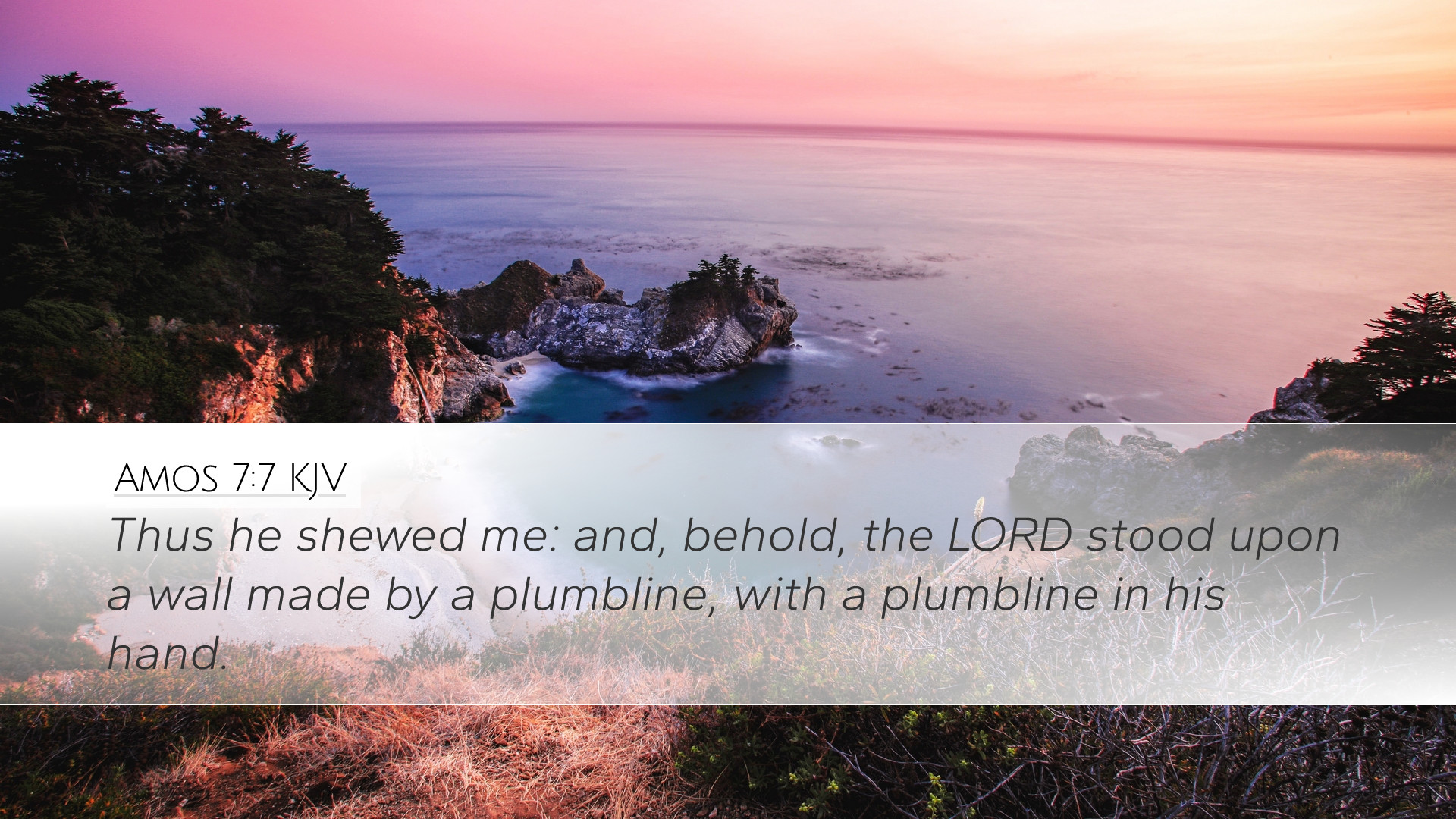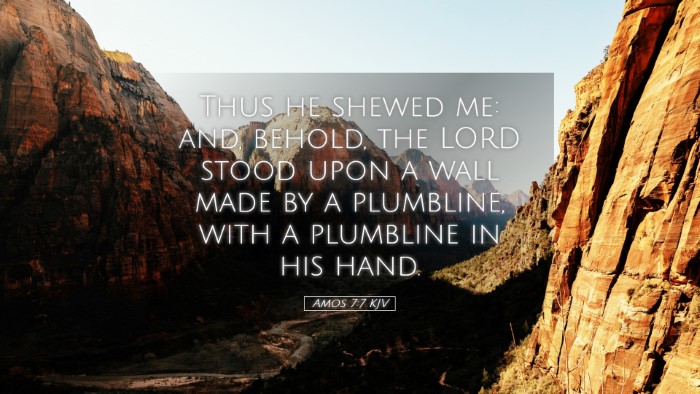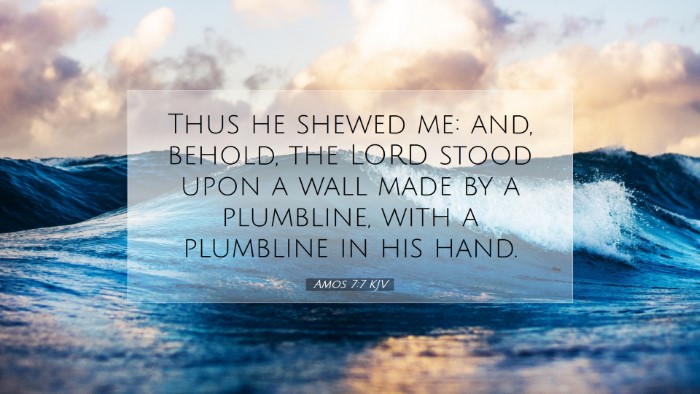Old Testament
Genesis Exodus Leviticus Numbers Deuteronomy Joshua Judges Ruth 1 Samuel 2 Samuel 1 Kings 2 Kings 1 Chronicles 2 Chronicles Ezra Nehemiah Esther Job Psalms Proverbs Ecclesiastes Song of Solomon Isaiah Jeremiah Lamentations Ezekiel Daniel Hosea Joel Amos Obadiah Jonah Micah Nahum Habakkuk Zephaniah Haggai Zechariah MalachiAmos 7:7
Amos 7:7 KJV
Thus he shewed me: and, behold, the LORD stood upon a wall made by a plumbline, with a plumbline in his hand.
Amos 7:7 Bible Commentary
Commentary on Amos 7:7
Amos 7:7 states: "Thus he showed me: behold, the Lord stood upon a wall made by a plumbline, with a plumbline in his hand." This verse provides a significant insight into God's judgment and the standard by which He measures His people's faithfulness. Commentaries from esteemed theologians like Matthew Henry, Albert Barnes, and Adam Clarke enrich our understanding of this intricate verse.
Contextual Background
Before delving into the specific commentary, it is vital to consider the historical context of Amos' prophecy. Amos, a shepherd from Tekoa, delivered God's messages during a time of prosperity and moral decline in Israel. His warnings were directed toward both individual and national sins affecting the people’s relationship with God.
God’s Visual Metaphor
The imagery of a plumbline is crucial in understanding God’s method of measurement. The plumbline symbolizes the righteousness and moral standard required of His people. As Adam Clarke notes, "the plumbline was used to determine the straightness of a wall; similarly, God's judgment will reveal whether Israel's way is straight or crooked."
The Significance of the Wall
Matthew Henry emphasizes that "the wall represents the state of Israel, constructed upon the covenant with God." The wall, in this instance, signifies the faithfulness of Israel to its covenantal obligations. With the divine plumbline, God assesses whether Israel remains aligned with His standards.
Implications for Israel
- Judgment Unveiled: Henry also asserts that the standing of God upon the wall shows His readiness to execute judgment. The solemnity of the moment illustrates that Israel’s actions will be weighed, and they cannot escape accountability.
- Call to Repentance: Both Barnes and Clarke note that the message is a call to repentance. Unlike mere punishment, God’s judgment aims to awaken Israel’s awareness of their sin and lead them to restoration.
- God’s Sovereignty: The act of God ‘standing upon’ the wall indicates His sovereignty over not just Israel, but the entire created order. It signifies God’s active engagement in the affairs of men, confirming that reality is not beyond His control.
The Role of the Prophet
Amos’ role as a prophet is deeply intertwined with the action of assessing Israel’s spiritual state. As Clarke notes, "The prophet serves as the messenger, revealing not only the impending judgment but also the reasons behind it." It is powerful to consider the sobering responsibility placed upon prophets like Amos to communicate God’s assessments of His people.
Encouragement and Warnings
Despite its focus on judgment, this passage also contains an implicit message of hope and realignment with God’s will. God using a plumbline showcases His desire for His people to return to righteousness. Henry points out, "The plumbline signifies that there is still time for Israel to correct its course before the ultimate devastation occurs."
Application for Today
The imagery found in Amos 7:7 continues to resonate within the modern church and individual believers. Commentators urge pastors, students, and theologians to draw lessons relevant to contemporary spiritual evaluation.
- Moral Standards: Just like the plumbline, God has established His Word as the standard against which believers should measure their lives. In an age of relative moral values, the call to obedience remains essential.
- Self-Assessment: This passage serves as an invitation for self-examination. Are our lives and ministries aligned with the standards set forth in Scripture? Acknowledging where we stand is crucial for spiritual growth.
- God’s Mercy: The call to repentance highlighted in this verse points to God's merciful nature. Just as He extends an opportunity for Israel to amend its ways, today’s faithful are encouraged to respond to God’s calling for reconciliation.
Concluding Thoughts
Amos 7:7 is a potent reminder of God’s unchanging standards and His continual evaluation of His people. The plumbline serves not only as a symbol of judgment but also of hope and correction. The insights extracted from the commentaries of Matthew Henry, Albert Barnes, and Adam Clarke provide a framework for understanding the depth and breadth of God's message through Amos, encouraging believers to strive for righteousness in alignment with the plumbline of God’s Word.


